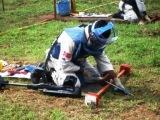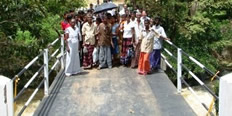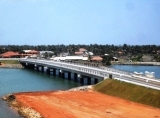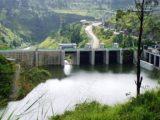The Embassy of Japan in Sri Lanka is also accredited to the Republic of Maldives
|
Japan’s Development and Economic Cooperation to Sri LankaJapan’s cordial relationship with Sri Lanka dates back to 1952, when Japan established diplomatic relations with Sri Lanka (then Ceylon). Since then, Japan has been a long- time partner in Sri Lanka’s socio-economic development as well as in the process of peace enhancement and reconciliation. Japan has also promptly provided relief and reconstruction assistance for conflict affected communities and those affected by natural disasters such as floods, droughts and tsunami. As of the end of December 2010, the Government of Japan has provided around 1,100 billion Japanese Yen (JY) (approximately Rs. 1,400 billion) as assistance to Sri Lanka under its various funding schemes that have benefitted people in all parts of the country including those in conflict affected areas. This assistance is provided through several funding schemes such as Grant Assistance, Technical Cooperation, and Yen Loan scheme and mainly executed by the Japan International Cooperation Agency (JICA) in close cooperation with the Government of Sri Lanka. In addition, Japan provides support through UN Agencies, World Bank, Asian Development Bank and local, Japanese, and international NGOs. Japan’s assistance to Sri Lanka mainly focuses on two areas which are inter-related, and the assistance is expected to produce synergetic effects;
2. Medium and Long-term Vision for Development
The recent major assistance projects for socio-economic infrastructure include: i) improvement of Anuradhapura Teaching hospital by providing new facilities with medical equipment; ii) construction of Vavuniya- Kilinochchi Transmission Line, iii) improvement of central functions of Jaffna Teaching Hospital; iv) construction of the new Mannar Bridge and improvement of the Causeway; v) improvement of Kandy City Wastewater Management; vi) Eastern Province Water Supply Development; vii) Provincial/Rural Roads Development; viii) construction of Upper Kotmale Hydro Power; ix) development of Solar Electric Power Generation in Hambantota, x) construction of Southern Highway from Kottawa to Kurundugahahetekma, and xi) construction of the first section of the Outer Circular Highway in the outskirts of Colombo. These projects are expected to contribute not only to the development and welfare of all people of Sri Lanka, but also serve as a symbol of friendship between the people of Japan and the people of Sri Lanka. Especially, the projects in the Northern and the Eastern Provinces are expected to promote sustaining peace and reconciliation among all communities.
Under Japan’s Technical Cooperation, a total of 11,057 Sri Lankan professionals and students have been trained in various fields in Japan and 1,724 Japanese Experts ad 788 Japan Overseas Cooperation Volunteers (JOCVs) have been dispatched to Sri Lanka up to the end of March 2009. At present, 56 Volunteers are actively working at the grassroots level and over 20 Japanese experts are working with counterparts in relevant Ministries and institutions. In order to strengthen the capacity of Northern and Eastern provincial authorities, Japan is currently involved in a project to build capacity of the local officials concerned. In addition, there are several scholarships offered by the Government of Japan to young Sri Lankan public officers in various fields of expertise. 15 officers selected for the Human Resource Development scholarship are presently pursuing their post-graduate studies in three universities in Japan |
||||||||
|---|---|---|---|---|---|---|---|---|---|
|
|||||||||
|
|||||||||
. |
|||||||||
The Government of Japan also provides assistance to Sri Lanka through international agencies such as the World Bank, Asian Development Bank and UN Agencies via Japan Special Fund, Japan Fund for Poverty Reduction, Japan Social Development Fund, and Human Security Trust Fund etc. The Eastern and North Central Provincial Road Project, Poverty Reduction through Rural Infrastructure Maintenance, US$ 11 million (approximately Rs. 1,250 million) through IOM, UNHCR, UNICEF, and ICRC for providing shelter, food, water and sanitation to Internally Displaced Persons (IDPs) living in camps. In addition, US$ 7 million (approximately Rs.800 million) was provided through seven Japanese NGOs operating in Sri Lanka under the Japan Platform Fund to meet emergency humanitarian needs in conflict affected areas. |
|
||||||||
 Manual De-Mining |
In order to respond to the various urgent needs at grass-root level, Japan has supported a community based organizations through its Grant Assistance for Grassroots Human Security Projects (GGP). This scheme has been in operation in Sri Lanka since 1989, and has so far provided over Rs. 2,900 million worth of assistance for 212 projects. Japan has continued to be the leading donor assisting in de-mining in the North and the East, and has provided US$ 21 million since 2003 through the GGP scheme to accelerate resettlement and development.
These initiatives portray Japan’s strong commitment to assist the development and recovery of Sri Lanka as well as improving welfare of the people. Through these assistance, Japan strongly hope that the people will directly benefit from the development and recovery initiatives, improve their livelihoods, enjoy sustainable peace through reconciliation efforts, and achieve self-reliance and socio-economic development.
|
||||||||
 Bridge in Badulla constructed through GGP |
|||||||||
Japan’s Role in the Private Sector of Sri Lanka
Improving the business environment is very crucial at this stage, especially in the context of new investment opportunities that have emerged in the entire island including the Northern and the Eastern parts of the country. We hope that the Government of Sri Lanka will capture this opportunity by creating a stable macroeconomic environment and reducing the cost of doing business where businesses and industries could thrive. It is in this context that the Government-Private Joint Forum was launched last year, which forms a framework for improving the business environment for the Japanese companies operating in Sri Lanka. The regular discussions between the Sri Lankan Government, Japanese companies and the Embassy of Japan will not only benefit the Japanese companies, but will also contribute to improving the business environment in Sri Lanka.
One significant event on promoting the Sri Lanka and Japanese businesses is the Joint Meeting of the Sri Lanka-Japan and Japan-Sri Lanka Business Co-operation Committees which is due to hold its 16th gathering in Tokyo in 2011. This event will provide opportunity for business partners to share experiences, meet new business partners, obtain guidance and insight on investment opportunities and forge new heights in promoting and enhancing Japanese investment, bilateral trade, and tourism between the two countries.
|
|||||||||
|
|||||||||
Copyright (C) 2012 Embassy of Japan in Sri Lanka Legal Matters | About Accessibility | Privacy Policy |
No.20, Srimath R.G. Senanayake Mawatha, Colombo7, Sri Lanka
Tel: +94-11-2693831/2693832/2693833
FAX: +94-11-2698629







